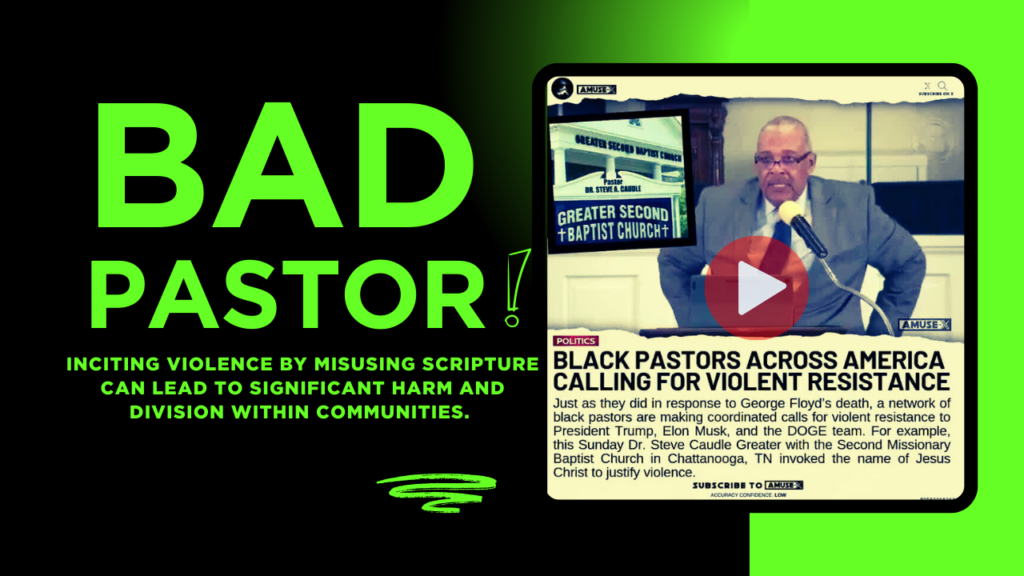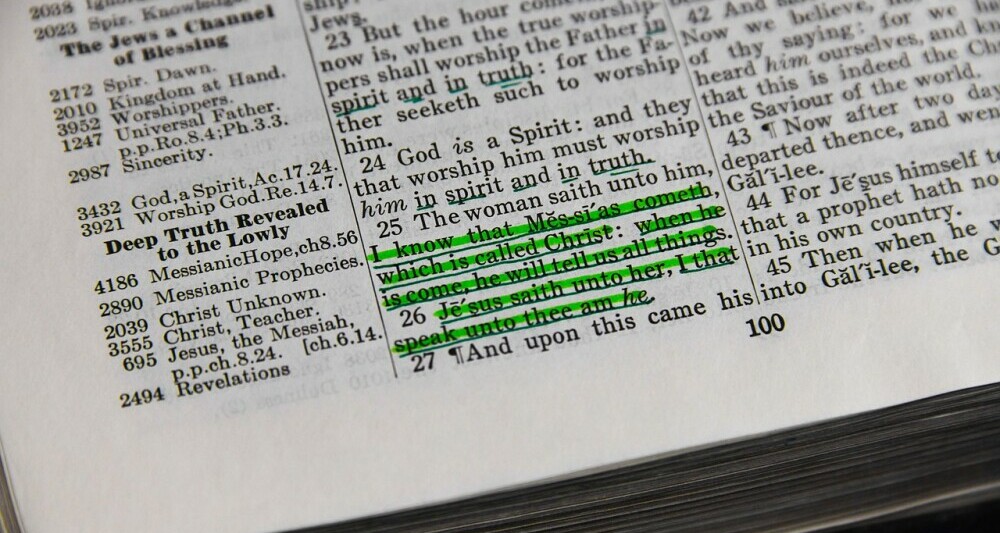Is It Biblically Correct to Consider President Donald Trump’s Decisions and Actions with Elon Musk as Christian Persecution?
Misinformation and violent rhetoric about DOGE is spilling out into pulpits across the United States: Pastor Steve stated the following quoting Matthew 11:12 in his sermon:
“No one likes violence, but sometimes violence is necessary. When Elon Musk forces his way into the U.S. Treasury and threatens to steal your personal information and your Social Security check, there is a possibility of violence. Sometimes the devil will act so ugly that you have no other choice but to get violent and fight.” (Dr. Steve Caudle Greater. Second Missionary Baptist Church Chattanooga, TN.)
Inciting violence by a Theologian misusing scripture can lead to significant harm and division within communities. It’s crucial for Christians to approach the Bible with care and understanding, recognizing the importance of context in interpreting its messages.
In this article we explore Matthew 11:12 by looking at its historical and literary background, the audience it was written for, and the main themes of grace and mercy found throughout the Bible. Scripture is meant to uplift people, not to create division or violence like Dr. Steve dose in the video below. As Christians, we can be agents of peace and bring about positive change in the world.
Before you continue reading, take a moment to pause and watch the sermon of Dr. Steve Caudle Greater on Matthew 11:12 and incites and promotes violence.
The Scripture in Context
The verse in question is Matthew 11:12, which states:
“And from the days of John the Baptist until now the kingdom of heaven suffers violence, and the violent take it by force.” (Matthew 11:12, NKJV)
A similar passage is found in Luke 16:16:
“The Law and the Prophets were until John. Since that time the kingdom of God has been preached, and everyone is pressing into it.” (Luke 16:16, NKJV)
These verses can be difficult to interpret because of the strong language used, but understanding their historical, cultural, and theological context helps reveal their true meaning.
Breaking Down the Meaning
1. Who is Speaking, and What is the Context?
Jesus is speaking to the crowd about John the Baptist. He is explaining the significance of John’s ministry and its connection to the arrival of the Kingdom of God. At this point, John had been imprisoned (Matthew 11:2), and Jesus was addressing concerns about John’s role as the forerunner of the Messiah.
2. What Does “the Kingdom of Heaven Suffers Violence” Mean?
There are two primary interpretations of this phrase:
- Interpretation 1: The Kingdom is Under Attack
Some scholars believe that “the kingdom suffers violence” refers to opposition and persecution. John the Baptist had been arrested, and Jesus Himself would later face violent rejection and crucifixion. The religious leaders of the time (Pharisees and Sadducees) opposed the message of the kingdom, and many prophets before John had suffered violence for proclaiming God’s truth (Matthew 23:37). - Interpretation 2: The Kingdom Requires Spiritual Determination
Others believe that “violence” refers to the determined, forceful pursuit of God’s kingdom. The phrase “the violent take it by force” can mean that people who are desperate for God’s kingdom must seize it with passion, zeal, and unwavering faith. The Greek word for “violent” (biastēs) can mean “forceful” or “strong-willed,” implying those who enter the kingdom do so with earnestness and determination.
Both interpretations have truth in them—the Kingdom of God faces opposition, but those who desire it must also passionately pursue it.
How Does This Apply to Today?
1. The Kingdom of God Still Faces Opposition
Just as John the Baptist and Jesus faced persecution, Christians today experience opposition when they live out their faith. Whether through social rejection, legal restrictions in some countries, or personal spiritual battles, the enemy still works to resist God’s kingdom.
Example:
- In many parts of the world, Christians face persecution for preaching the gospel. Some are imprisoned, others are ostracized from their families, and some even lose their lives for their faith.
- Even in non-persecuted nations, biblical values are often challenged in media, politics, and culture. Standing up for righteousness can lead to criticism and rejection.
2. The Need for Spiritual Zeal and Determination
Jesus’ words also encourage believers to passionately pursue the things of God. Entering God’s kingdom is not a passive experience but requires faith, persistence, and spiritual hunger.
Example:
- Overcoming sin and temptation requires persistence and spiritual “violence”—actively resisting the devil (James 4:7), renewing the mind (Romans 12:2), and fleeing temptation (2 Timothy 2:22).
- Growing in faith demands intentionality—prayer, fasting, studying the Word, and surrounding oneself with strong Christian community.
- Evangelism requires boldness—sharing the gospel despite rejection or ridicule.
Living Out This Scripture
- Be Bold in Your Faith – Just as John the Baptist fearlessly proclaimed the coming of the Messiah, Christians today must courageously stand for truth. This means sharing the gospel with others, standing firm against worldly influences, and living a life that reflects Christ.
- Fight Against Spiritual Attacks – The enemy seeks to steal, kill, and destroy (John 10:10). Believers must put on the armor of God (Ephesians 6:10-18) and resist temptation with the Word of God, just as Jesus did when tempted in the wilderness (Matthew 4:1-11).
- Pursue the Kingdom of God Passionately – Jesus said, “Seek first the kingdom of God and His righteousness” (Matthew 6:33). This means prioritizing prayer, Bible study, and personal holiness over distractions and worldly desires.
- Support Persecuted Christians – Recognizing that the kingdom still “suffers violence,” believers should pray for and support those facing persecution worldwide (Hebrews 13:3).
A Call to Action
Jesus’ statement in Matthew 11:12 is both a warning and a call to action. The kingdom of God faces resistance, but those who truly desire to follow Christ must pursue Him with passion, determination, and unwavering faith.
- Are you pressing into God’s kingdom with the same intensity as those who “take it by force”?
- Are you actively resisting temptation and standing firm against spiritual attacks?
- Are you bold in sharing your faith, even when facing opposition?
Is It Biblically Correct to Consider President Donald Trump’s Decisions and Actions with Elon Musk as Christian Persecution?
Understanding the background and interpretation of Matthew 11:12, we recognize that the Kingdom of God faces opposition, but we must be careful in defining what constitutes true Christian persecution.
1. What is Biblical Persecution?
Persecution, in the biblical sense, refers to hostility, suffering, or oppression faced because of faith in Jesus Christ. Jesus warned His followers:
“If the world hates you, keep in mind that it hated me first.” (John 15:18, NIV)
“In fact, everyone who wants to live a godly life in Christ Jesus will be persecuted.” (2 Timothy 3:12, NIV)
Throughout history, biblical persecution has included imprisonment, martyrdom, exclusion from society, and legal restrictions on worship and evangelism (e.g., Acts 5:40, Hebrews 11:35-38).
2. Evaluating Trump’s Decisions and Elon Musk’s Actions
If we examine Donald Trump’s presidency (2017-2021, 2025) and Elon Musk’s influence (as a business leader, not a political ruler) in light of biblical persecution, we must ask:
- Did Trump pass laws that criminalized Christianity or banned the Bible? No. In fact, his administration often expressed support for religious freedom.
- Did Trump’s policies lead to the imprisonment or execution of Christians for their faith? No. There was no targeted oppression of Christians under his leadership.
- Did Elon Musk persecute Christians through his companies (e.g., Tesla, X/Twitter, SpaceX)? No. While Musk’s companies operate in secular industries, they have not enforced religious persecution.
While some political decisions may have been controversial for Christians (e.g., stances on moral issues, policies on religious liberties, free speech, or foreign relations), these do not equate to the violent, faith-based persecution described in Scripture.
3. Christian Persecution in the USA vs. Other Nations
- In the USA, Christians still have the freedom to worship, preach, and live out their faith without imprisonment. There may be social and cultural opposition (such as Christian beliefs being ridiculed in media or restrictions on public expressions of faith), but this is different from biblical persecution.
- In other nations, Christians face real biblical persecution—being imprisoned, tortured, or executed for their faith (e.g., North Korea, China, Nigeria, Afghanistan).
To equate political and business decisions in the USA to true persecution could diminish the suffering of believers who are genuinely persecuted worldwide (Hebrews 13:3).
4. How Should Christians Respond?
- Stay Spiritually Disciplined: Even if there is increasing social pressure against Christian values, believers should remain steadfast in prayer, studying Scripture, and living out their faith boldly (Ephesians 6:10-18).
- Engage in Culture, Not Fear It: Instead of focusing on political figures as enemies, Christians should influence society through love, truth, and integrity (Matthew 5:13-16).
- Pray for Leaders: The Bible instructs believers to pray for all in authority (1 Timothy 2:1-2), regardless of their political stance.
- Support Persecuted Christians: Rather than viewing cultural shifts as persecution, Christians should actively support believers suffering real oppression worldwide (Hebrews 13:3).
While Trump’s decisions and Elon Musk’s actions may have political and cultural implications, they do not constitute biblical persecution against Christians. True persecution involves direct suffering for the faith, such as imprisonment, torture, or execution, which is happening in other parts of the world but not due to Trump or Musk’s influence. Instead of fearing political figures, Christians should focus on spiritual growth, cultural engagement, and supporting believers facing true persecution globally.
Paul Mondo











